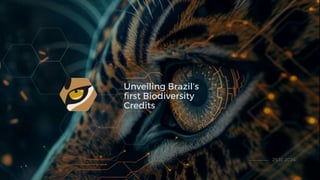Unveiling Brazil's first Biodiversity Credits by Hannah Simmons
- 2. ABOUT ERA A company led by women to regenerate our ecosystems
- 3. In 2022, ERA won a grant from the Regen Network to build a Biodiversity Crediting Protocol. Our goal is to reward land stewards who are protecting habitat 8 Core Principles of our Biodiversity Crediting Protocol: Inclusive of Indigenous Peoples and Local Communities Ease of adoption (low cost & low barrier to entry) Not for biodiversity offsetting (Nature-Positive Contribution Credit) Practice-based vs. outcomes-based # of credits is define by habitat area x stewardship factors Bottom-up vs. top-down Price is defined by the cost of conservation (transparent, fair) Once purchased, immediately retired, no secondary markets HOW DID WE GET HERE?
- 4. + INDICATORS & METRICS = UMBRELLA SPECIES HEALTH HABITAT QUALITY + USpToC INTERVENTIONS HABITAT AREA x Presence/absence # of individuals movement & distribution monitoring methods Taxonomic Diversity Shannon Index Evenness Index Ecosystem Disturbances mitigation measures Customizable metrics to account for local context, threats, and disturbances, ex: fire prevention community engagement restoration 1 credit represents 1 hectare of umbrella species habitat stewarded for biodiversity conservation for 1 year
- 5. LEVERAGING TECHNOLOGY Blockchain Eco-Marketplace Leveraging AI to analyze thousands of data points Biodiversity Crediting Protocol for Umbrella Species Stewardship
- 6. The Pantanal Conservation Network is a group of Private Natural Reserves (RPPN) with 40,000 hectares of jaguar habitat managed by Instituto Homem Pantaneiro THE PROJECT AREA
- 7. Number of Individuals Shannon Index 2.7 MONITORING 2021 2022 2023 2.9 3
- 8. INTERVENTIONS 97 actions held by the Environmental Military Police (PMA) to protect the environment 8 fire brigade team members in action. 14 trails maintained or cleaned. 14 environmental education actions conducted. 5 fire outbreaks fought in different areas. 3 burned areas monitored. 63 km of escape routes created. 14 women trained for fire combating. 6 fire fighting actions. New equipment such as tractors, brush cutters, water tanks, and improvements in uniforms and personal protective equipment (PPE). Lecture about strategies for protecting domestic animals. 3 light repellents and 4 camera traps to keep jaguars away from community areas. 4 agroforestry systems planted and maintained 25,000 seedlings planted in Restoration Actions Partnership agreement with the World Society for the Protection of Animals (WSPA). Animal Rescue Technical Base (BARTA) retrofit. 3 scientific publications released.
- 9. Foto: Sebasti├Żo Salgado OUR RESULTS First Monitoring Period 2021 2022 2023 Total Project Costs (US$) $604k $704k $853k Total Biodiversity Credits 22k 26k 29k Total price per credit (US$) $27 $27 $36
- 10. BUILDING THE MARKET 55% of global GDP ($58 trillion) is dependent on nature (S&P Global Report). The private sector recognizes the real risks nature loss is already having and will continue to have to business and livelihoods, through resource scarcity and disrupted supply chains. Companies are slowly mapping their nature dependencies and risks. We need governmentsŌĆÖ immediate leadership to strengthen the policies and regulations to drive private sector action, mobilizing investments to halt and reverse nature loss by 2030. Biodiversity credits are one tool in our toolbox to channel conservation funding to the frontline, rewarding land stewards who are excluded from the carbon markets. Companies must strive for more than Net-Zero (neutralization). We must move towards Nature-Positive Contributions - a type of PES based on biodiversity!











